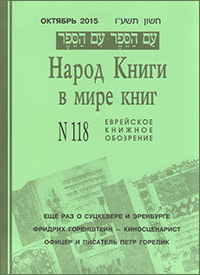The People of the Book in the World of Books is a Russian bimonthly publication for serious readers with Jewish interests. Our English website includes only the summaries of the published articles. To access the complete text of them, please visit the Russian version of this website.

|
||
|
This issue of the magazine includes:
• History: Why and How Three Polish Jews Slandered Ilya Ehrenburg
After the death of the famous Soviet writer and public figure Ilya Ehrenburg (1891–1967), his friend the Israeli Yiddish poet Avrom Sutzkever published a very warm memoir about him that concluded as follows: “The Jewish world presented him with a very serious charge, nothing less than that he was implicated in the arrests of Soviet Yiddish writers. I have investigated this issue for years and am convinced these charges are groundless.” The paradox is that it was Sutzkever who in 1956, as editor-in-chief of the Tel-Aviv-based Yiddish quarterly Di goldene keyt, printed the publication that launched the aggressive anti-Ehrenburg campaign in the western media. How can we explain this paradox? The article attempts to answer this question and analyze events of more than half a century ago.
• Review: The Accord between Genius and Craft
In the introduction to one of his screenplays, Russian author and screenwriter Friedrich Gorenstein (1932–2002) expressed yearning for the golden age of arts, the times of the Renaissance when “art was life and life was art.” As he suggested, “It is necessary to return to the Renaissance age’s familial accord between the sublime and the base, between genius and craft.” The reviewer of the recently published collection of Gorenstein’s screenplays argues this aspect of his literary work was indeed the product of such an “accord.” After a detailed examination of the texts in the collection, the reviewer concludes, “A more complete edition of Gorenstein’s screenplays would be a good addition to the main corpus of his oeuvre. Still, it is important not to confuse the main corpus of a great author’s legacy and the products of a ‘familial accord.’”
• Looking through Russian Literary Magazines: Novels and Articles of Jewish Interest
• Jewish Calendar of Significant Dates: November–December 2015
• Bibliography: 25 New Books |


